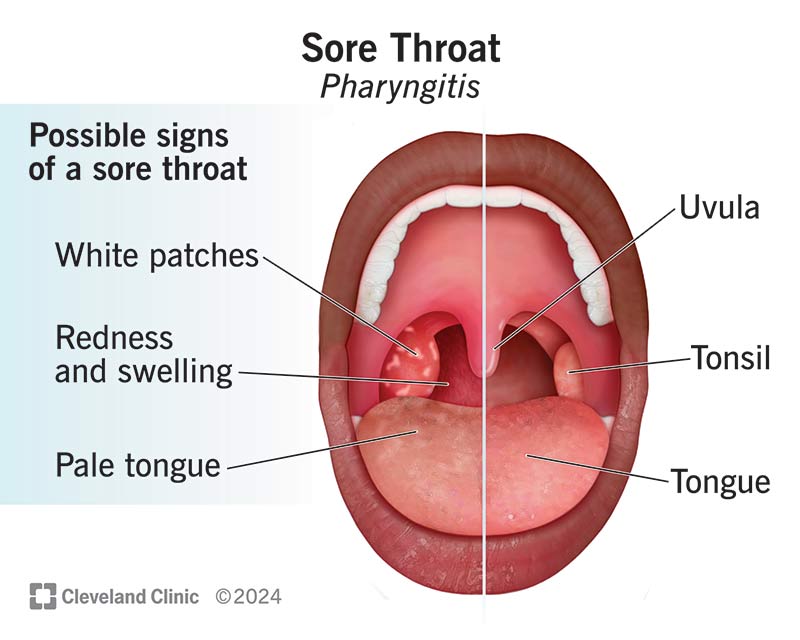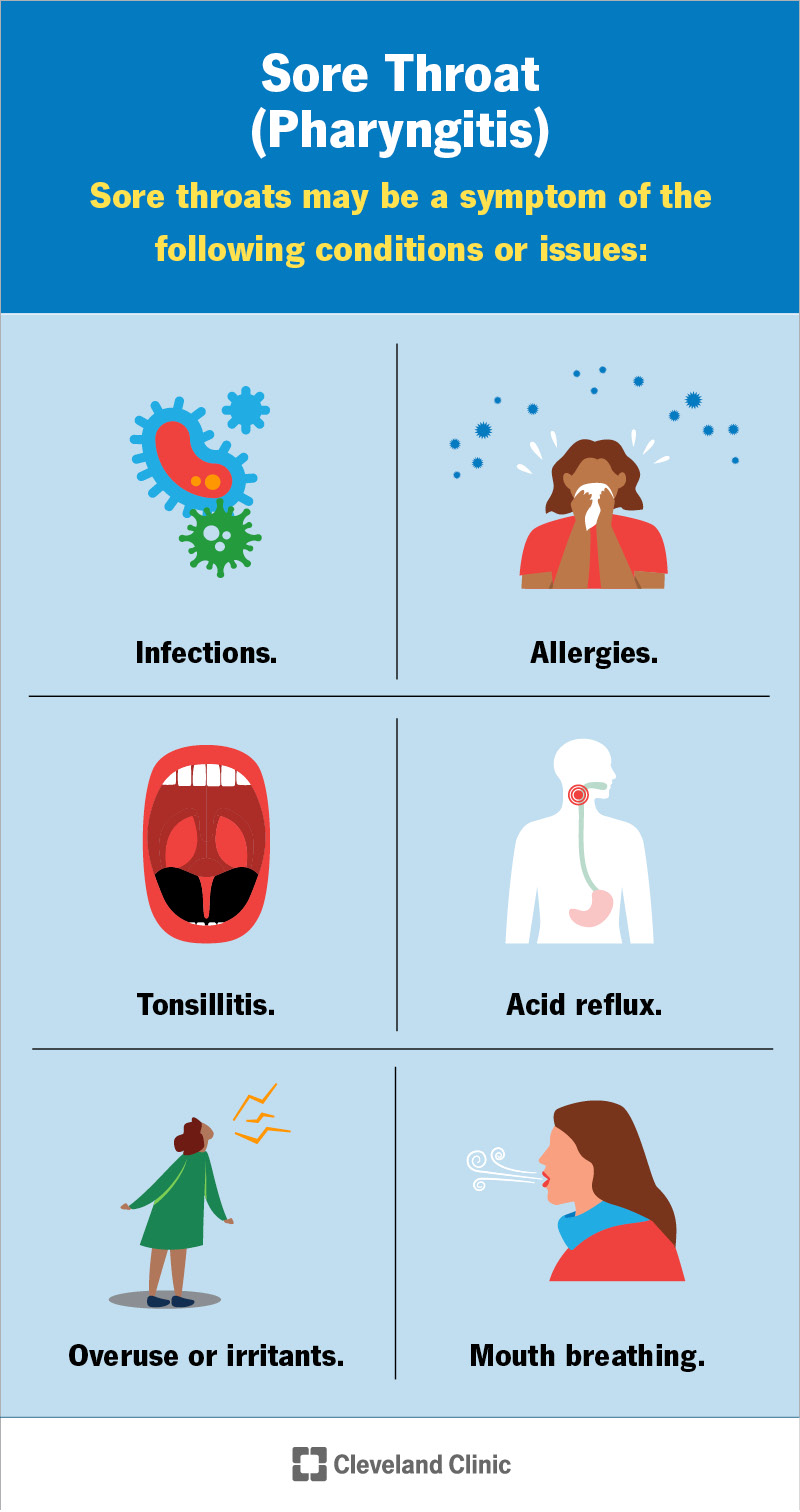A sore throat (pharyngitis) is a scratchy or burning feeling in the back of your throat. It may hurt to swallow or talk. Most sore throats happen because of a viral infection, like the common cold or flu. In addition to the soreness, you may have symptoms like a cough or runny nose. Most sore throat symptoms go away within three to 10 days.
Advertisement
Cleveland Clinic is a non-profit academic medical center. Advertising on our site helps support our mission. We do not endorse non-Cleveland Clinic products or services. Policy

Image content: This image is available to view online.
View image online (https://my.clevelandclinic.org/-/scassets/images/org/health/articles/8274-sore-throat-pharyngitis-signs)
A sore throat, or “pharyngitis,” is a scratchy, painful feeling in the back of your throat (pharynx). It happens when the tissue lining your throat (mucosa) becomes inflamed. If you have a sore throat, it may hurt to swallow or talk.
Advertisement
Cleveland Clinic is a non-profit academic medical center. Advertising on our site helps support our mission. We do not endorse non-Cleveland Clinic products or services. Policy
Many things cause pharyngitis, from viral and bacterial infections to allergies and sleeping with your mouth open. Most sore throat symptoms go away with home care within a few days. But you should contact a healthcare provider if your sore throat lasts longer than a week, gets worse or you develop symptoms like a fever or swollen lymph nodes.
There are two main types of pharyngitis. Healthcare providers categorize them based on how long symptoms last:

Image content: This image is available to view online.
View image online (https://my.clevelandclinic.org/-/scassets/Images/org/health/articles/8274-sore-throat)
Pharyngitis may start with a raspy feeling in your throat, as if your throat is dry. If your sore throat gets worse, you may feel a sharp pain in your throat when you swallow or talk. You may feel the pain in your ears or down the side of your neck.
If an infection is causing your sore throat, additional symptoms may include:
Advertisement
Video content: This video is available to watch online.
View video online (https://cdnapisec.kaltura.com/p/2207941/sp/220794100/playManifest/entryId/1_cxajzelr/flavorId/1_5f3sgelj/format/url/protocol/https/a.mp4)
Learn the difference between pharyngitis and tonsillitis.
Most sore throats happen because you have a viral infection, like the common cold or flu. Less often, a sore throat (pharyngitis) may be a sign of the following conditions or issues:
Your healthcare provider will ask about your symptoms. They’ll perform a physical exam that involves looking at your throat, tongue and possibly your ears. They may do a strep test to check for the bacteria that causes strep throat.
Testing is important in case your provider can’t tell from your symptoms alone if your sore throat is related to a virus or bacteria. The results determine what treatments you’ll need.
Treatment depends on what’s causing your pharyngitis. Viral infections usually clear up on their own within a week. In the meantime, your healthcare provider may recommend over-the-counter (OTC) medicines to ease your sore throat.
Other treatments for a sore throat may include:
Advertisement
Usually, a sore throat isn’t a serious medical issue. Instead, it’s typically an unpleasant sign that you’re sick with a cold or the flu.
Most sore throats related to a viral infection go away within three to 10 days. If your sore throat lasts longer than this, it may be a symptom of a condition that requires prescription medications or other treatments your healthcare provider can recommend.
Viral infections like colds and the flu often cause pharyngitis. You can reduce your chances of getting a sore throat by protecting yourself against these common infections. You can:
It may take some time to cure what’s causing your pharyngitis. In the meantime, there are at-home remedies you can try to relieve your sore throat. You can:
Advertisement
Contact your healthcare provider if your sore throat lasts longer than a week. Reach out if you have any of the following symptoms:
Questions to ask include:
Maybe your sore throat started with a tickle in the back of your throat. Now that tickle is a pain — literally — and it hurts a lot when you swallow or talk. Most cases of pharyngitis happen because you have a viral infection that’ll run its course in a week or so. But you may need antibiotics if the soreness stems from a bacterial infection. Fortunately, there are many home remedies to ease sore throat pain.
There are instances, though, when pharyngitis may be a symptom of a serious medical issue. If you have a sore throat that lasts more than a week or keeps coming back, talk to a healthcare provider.
Advertisement
Learn more about the Health Library and our editorial process.
Cleveland Clinic's health articles are based on evidence-backed information and review by medical professionals to ensure accuracy, reliability, and up-to-date clinical standards.
Cleveland Clinic's health articles are based on evidence-backed information and review by medical professionals to ensure accuracy, reliability, and up-to-date clinical standards.
If you have conditions affecting your ears, nose and throat, you want experts you can trust. Cleveland Clinic’s otolaryngology specialists can help.
